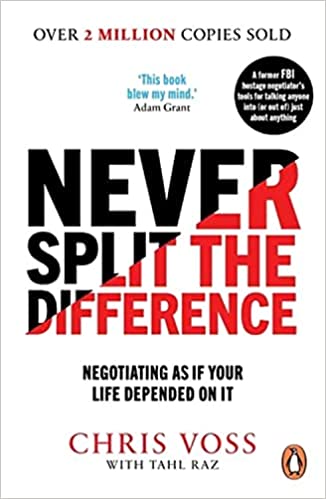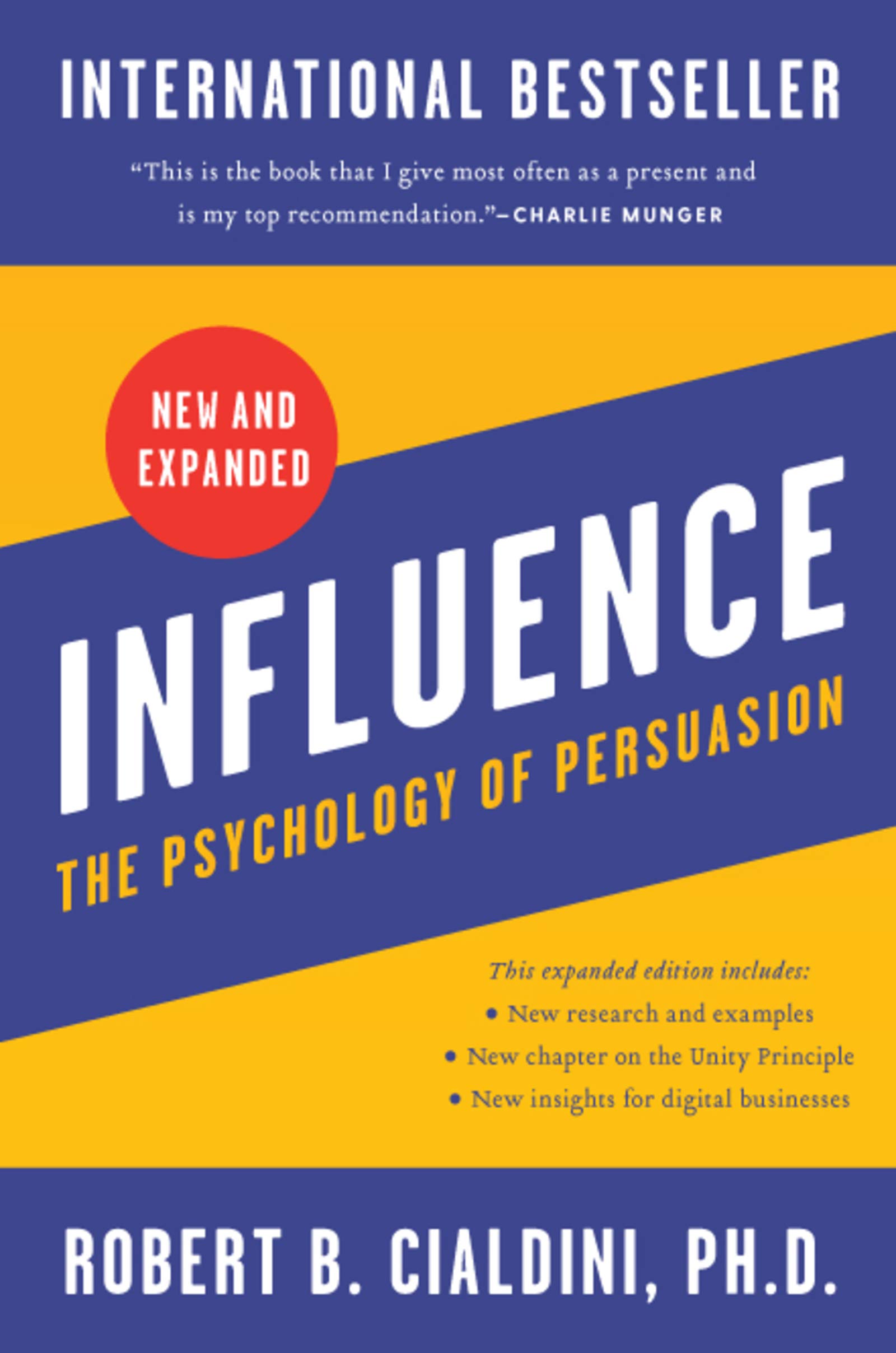Snippets about: Persuasion
Scroll left and right !
How (Not) To Fight Prejudice And Stereotyping
Chapter 6 discusses how to open minds on charged topics like prejudice and stereotyping. All too often, when we encounter someone expressing a biased opinion, we're quick to preach about why they're wrong or prosecute them as a bad person. But research shows that making people feel attacked for their views often backfires, causing them to cling to those views more stubbornly.
A more effective approach is to engage them with curiosity, asking questions to understand the roots of their beliefs. Prompting them to walk through the logic of their position can reveal holes that they hadn't noticed before. And introducing complex perspectives - showing there are more than two sides to an issue - can shake them out of all-or-nothing thinking.
Section: 2, Chapter: 6
Book: Think Again
Author: Adam Grant
The Unlikely Success Story Of Daryl Davis
Daryl Davis, a Black pianist, seems like an unlikely candidate to win over white supremacists. Yet over the past 30 years, he's directly inspired over 200 KKK members to leave the hate group and renounce their racist beliefs. His approach is a masterclass in motivational interviewing:
- When meeting a KKK member, Davis starts by finding common ground around a shared interest, like music. He builds rapport before ever mentioning race.
- He asks the person questions to understand their life story and how they came to join the KKK. He listens with genuine curiosity rather than judgment.
- He prompts them to explain the logic behind their racist views, which often reveals gaping holes and sparks some cognitive dissonance.
- When they express a stereotype, he gently debunks it by pointing to himself as a counterexample (e.g. "You say Black people are unintelligent, but I'm a Black man with a college degree. How do you explain that?")
- He shows respect even when their beliefs are abhorrent.
Section: 2, Chapter: 7
Book: Think Again
Author: Adam Grant
If There Is Any One Secret Of Success
To effectively persuade and influence others:
- Don't criticize, condemn, or complain. That only breeds resentment.
- Give honest and sincere appreciation.
- Arouse in the other person an eager want by talking in terms of their wants and needs, not yours.
- Try honestly to see things from the other person's point of view. "If there is any one secret of success, it lies in the ability to get the other person's point of view and see things from that person's angle as well as from your own."
Section: 1, Chapter: 3
Book: How to Win Friends and Influence People
Author: Dale Carnegie
Use the Reciprocity Rule to Your Advantage
You can leverage the reciprocity rule in your favor:
- Proactively do favors and provide value for others
- They will feel a sense of indebtedness and want to repay you
- This makes them more likely to do what you request later
- But beware of those who purposely use this to manipulate - recognize when gifts have strings attached
Section: 1, Chapter: 2
Book: Influence
Author: Robert Cialdini
Scarcity - The Rule of the Few
The scarcity principle states that opportunities seem more valuable when they are less available. Items and opportunities are more desirable when they are rare, dwindling or difficult to obtain
This is a widely used weapon of influence - advertisers emphasize scarcity to drive demand
- Scarcity works on the pain of "loss" - we don't want to miss out or lose access to something
- It especially affects us when we perceive we are losing freedoms we previously had
Section: 1, Chapter: 7
Book: Influence
Author: Robert Cialdini
The Allure Of Scientology's Celebrity Centre
The Church of Scientology's Celebrity Centre in Hollywood serves as a magnet for aspiring actors, writers, and artists hoping to make it big in the entertainment industry. With its grand façade and promises of personal and professional success, the Centre draws in wide-eyed newcomers to Los Angeles, offering them a sense of community and purpose in a cutthroat business. However, beneath the glamorous veneer lies a carefully crafted recruitment strategy, where potential members are love-bombed with flattery and subjected to a barrage of personality tests, auditing sessions, and high-pressure sales tactics to keep them in the fold and paying for more.
Section: 3, Chapter: 1
Book: Cultish
Author: Amanda Montell
"Ask For A Favor And They'll Like You More"
The Ben Franklin effect shows that asking weak ties for a favor makes them more likely to help you again in the future. When Franklin wanted to win over a rival legislator, rather than doing a favor for the man, Franklin asked to borrow a rare book from him. The rival was flattered and afterwards, was much more friendly and willing to help Franklin.
So don't just do favors for weak ties, ask them for favors too. People like to feel helpful, as long as the request isn't a burden. Make it specific, concrete and relevant to their interests.
Section: 1, Chapter: 2
Book:
Author:
Jim Jones's Seductive Charisma And Linguistic Prowess
Jim Jones, the mastermind behind the Peoples Temple, was a master manipulator who used his linguistic skills to attract and control followers from all walks of life. He employed code-switching techniques, seamlessly alternating between intellectual discourse and folksy charm to appeal to different audiences.
With African Americans, Jones highlighted his commitment to racial justice and peppered his speeches with Black church colloquialisms. When recruiting white hippies, he waxed poetic about socialist theory and quoted philosophers. Jones even coined loaded phrases like "revolutionary suicide" and "white night" to reframe disturbing concepts in a way that resonated with his followers. His ability to adapt his language to his listeners' backgrounds and desires was a key factor in his uncanny influence.
Section: 2, Chapter: 1
Book: Cultish
Author: Amanda Montell
Sorry About The Rain
In another study, people asking to borrow a stranger's phone were 422% more likely to get a "yes" response if they preceded their request with the words "I'm so sorry about the rain!" That one simple acknowledgement of shared experience increased compliance more than five-fold. Expressing vulnerability or invoking common ground activates the human impulse to cooperate, even between people with no existing relationship.
Section: 1, Chapter: 2
Book: The Culture Code
Author: Daniel Coyle
The Secret To Influence Is Arousing An Eager Want In The Other Person
The only way to influence other people is to talk about what they want and show them how to get it. Every act you have ever performed since the day you were born was performed because you wanted something.
Dr. Dewey said that the deepest urge in human nature is "the desire to be important." If you tell me how you get your feeling of importance, I'll tell you what you are. That is the most significant thing about you.
Section: 1, Chapter: 2
Book: How to Win Friends and Influence People
Author: Dale Carnegie
Motivational Interviewing
Motivational interviewing (MI) is a communication technique, originally developed for treating addiction, that uses listening and questioning to help people generate their own motivation to change:
- Asking open-ended questions - Invite reflection and elaboration with queries that can't be answered in one word. "What matters most to you about this issue?" vs. "Do you want to change?"
- Engaging in reflective listening - Paraphrase what you heard to check your understanding. "It sounds like you're frustrated with the current situation and feeling stuck."
- Affirming the person's autonomy and potential - Emphasize that they're in the driver's seat and capable of growth. "I trust that you know what's best for you. What do you think is a realistic first step?"
- Summarizing key points - Recap what you've heard, especially any "change talk" indicating motivation to do things differently. "So far you've highlighted the downsides of the status quo, and mentioned a few benefits of making a shift..."
Section: 1, Chapter: 7
Book: Think Again
Author: Adam Grant
Misleading "Passive Voice" Obscures Agency In Opioid Crisis
When discussing culpability for the opioid epidemic, pharma execs and consultants use the passive voice to deflect responsibility. McKinsey consultants write about "pills that were abused" and Purdue Pharma's reps say their products "have been associated with abuse." But this language masks the active role these companies played in causing the crisis through deceptive marketing, influencing doctors, and downplaying risks. To clearly assess the roots of such crises, Gladwell argues we must restore agency by asking "Who took what actions?" Not just "What happened?"
Section: 3, Chapter: 9
Book: Revenge of the Tipping Point
Author: Malcolm Gladwell
First, Arouse In The Other Person An Eager Want
"First, Arouse In The Other Person An Eager Want. He Who Can Do This Holds The World With Him"
Remember these key points in influencing others:
- The only way to influence people is to talk in terms of what the other person wants
- The deepest craving in human nature is the desire to be important and appreciated
- If you can arouse an eager want in a person and show them how to satisfy it, you hold the key to influencing their actions
- Before you speak, pause and ask yourself: "How can I make this person want to do it?"
Section: 1, Chapter: 3
Book: How to Win Friends and Influence People
Author: Dale Carnegie
The Sweetest Sound In Any Language Is A Person's Own Name
The name sets the individual apart and makes him or her unique among all others. The information we are imparting or the request we are making takes on a special importance when we approach the situation with the name of the individual.
People love their names so much that they will often donate large amounts of money just to have a building named after themselves. Jim Farley, one of the master politicians of all time, recalled that it was his ability to recall over 50,000 people's first names that transformed him from a small town businessman to a national political figure.
Section: 2, Chapter: 3
Book: How to Win Friends and Influence People
Author: Dale Carnegie
Getting to "That's Right"
The sweetest two words in any negotiation are "That's right." When someone says "you're right" they are not really agreeing, just getting you to leave them alone.
But when they say "that's right", they feel truly understood and are open to being persuaded. Strive to reach "that's right" not "you're right." To get to "that's right", summarize and paraphrase their worldview back to them until they respond with "that's right." This creates breakthroughs.
Section: 1, Chapter: 1
Book: Never Split The Difference
Author: Chris Voss
Appeal To The Nobler Motives
People will respond more positively when you make any request or suggestion seem to align with their own nobler motives. J.P. Morgan observed that a person usually has two reasons for doing something - one that sounds good and a real one.
Appeal to the one that sounds good to get them interested. For example, Rockefeller got a stubborn partner to continue a business relationship, not by emphasizing profits, but by praising his work uplifting humanity. Always help the other person feel that your suggested course of action serves the greater good and you will get more enthusiastic cooperation.
Section: 3, Chapter: 10
Book: How to Win Friends and Influence People
Author: Dale Carnegie
Detect Disengagement with Torso Shields
If a person's torso and feet orient away from you while talking, they likely feel disinterested or want to leave the conversation. Even if their face remains friendly, this "torso shielding" indicates psychological disengagement. Other distancing cues include:
- Crossing arms tightly
- Holding objects in front of chest
- Twisting torso to angle body away
- Placing barriers like a purse or pillow on lap
When you notice someone progressively shutting you out with their body language, gracefully end the interaction before they tune out completely. And if you catch yourself torso shielding, consider what's causing your discomfort and how you can reengage.
Section: 1, Chapter: 4
Book: What Every Body is Saying
Author: Joe Navarro
The FBI's Covert Negotiation Weapons
Over two decades of experience, the FBI Crisis Negotiation Unit developed a framework of proven negotiation tactics:
- Active Listening: Listen intently to your counterpart and make them feel understood
- Tactical Empathy: Recognize and vocalize your counterpart's perspective without necessarily agreeing
- Mirroring: Imitate your counterpart's speech patterns to build rapport
- Labeling: Put their feelings into words to show understanding and diffuse negativity
- Paraphrasing: Repeat back what they say in your own words
- Summarizing: Combine paraphrasing and labeling to reinforce key points
- Calibrated Questions: Gently say no by asking open-ended questions that start with "how" or "what"
Section: 1, Chapter: 1
Book: Never Split The Difference
Author: Chris Voss
Small Voluntary Commitments Open the Door to Bigger Requests
Salespeople and marketers leverage the principle of consistency to make bigger sales:
- Start by getting the prospect to make a small, easy commitment
- This could be agreeing to fill out a survey, accept a free sample, or make a statement supporting the product
- Later, pivot to making a related larger request, like buying a subscription
- They feel internal pressure to act consistently with their earlier commitment
- To resist unwanted influence attempts, be very careful about making commitments you don't want to be held to later
Section: 1, Chapter: 3
Book: Influence
Author: Robert Cialdini
The Seduction of Pessimism
Despite the real-world evidence that things tend to improve over time, pessimism always sounds more intelligent and insightful than optimism. Why?
- Pessimism sounds like someone trying to help you, while optimism sounds like a sales pitch
- Pessimists often extrapolate current trends without accounting for how reliably markets adapt
- Progress happens too slowly to notice, but setbacks happen too quickly to ignore
- Pessimistic views warn of risks to protect you, while optimism focuses on opportunities that may not pan out
Tempered optimism - expecting things to improve but at a gradual, uneven pace - is usually the best stance.
"Pessimism Just Sounds Smarter And More Plausible Than Optimism"
Section: 1, Chapter: 17
Book: The Psychology of Money
Author: Morgan Housel
Cognitive Ease: Why We Believe What Feels Familiar
Cognitive ease refers to the fluency with which our minds process information. When we experience cognitive ease, we tend to feel good, trust our intuitions, and accept information as true. This can lead to illusions of truth, where repeated exposure to a statement makes it feel more familiar and therefore more believable, even if it's false. Factors like clear fonts, simple language, and positive moods can induce cognitive ease, influencing our judgments and beliefs.
Section: 1, Chapter: 5
Book: Thinking, Fast and Slow
Author: Daniel Kahneman
In Debates, Aim To Understand, Not "Win"
Our desire for social status can warp everyday interactions. We often use "cognitive biases" - like assuming others' mistakes reflect their character while giving ourselves a pass - to feel "right" and protect our ego.
This clouds our judgment, especially in disagreements. We overlook information that might change our minds. We get overconfident, assume the worst of the other side, and use any rhetorical tactic to defend our view.
In the moment, making our case feels good - like an "intellectual orgasm." But in the long run, it can damage relationships and our own growth.
Section: 1, Chapter: 7
Book: Scarcity Brain
Author: Michael Easter
A Pointless Argument
"In a heated argument, you can always stop and ask, 'What evidence would change your mind?' If the answer is 'nothing,' then there's no point in continuing the debate. You can lead a horse to water, but you can't make it think."
Section: 2, Chapter: 5
Book: Think Again
Author: Adam Grant
The Art Of "Persuasive Listening"
When dealing with someone who strongly disagrees with us, it's tempting to just keep arguing our point louder and more insistently. But this direct approach often makes people put up their defenses and stop listening. A more effective tactic is "persuasive listening" - focusing on understanding their perspective so deeply that they feel heard and respected. Some tips:
- Ask more questions than you make statements. Aim for a ratio of at least 2 questions for every 1 assertion.
- Engage in reflective listening, paraphrasing what they said to check your understanding (e.g. "So it seems like your main concern is X, is that right?")
- Validate their feelings, even if you disagree with their logic (e.g. "I can see why this issue frustrates you, it's clearly something you care a lot about.")
- Express curiosity about how they came to their viewpoint (e.g. "I'm interested to know what experiences shaped your stance on this")
- Acknowledge common ground and areas where you agree.
Section: 2, Chapter: 5
Book: Think Again
Author: Adam Grant
Books about Persuasion
Communication
Persuasion
Negotiation
Personal Development
Never Split The Difference Book Summary
Chris Voss
Never Split the Difference teaches that negotiation is not about logic and rationality, but about emotional intelligence, empathy, and the subtle art of getting into your counterpart's head to uncover their real motivations and desires.

Persuasion
Communication
Business
Psychology
Influence Book Summary
Robert Cialdini
Influence is the quintessential guide to the six universal principles of persuasion - reciprocation, commitment and consistency, social proof, authority, liking, and scarcity - that shape our decisions and behavior, often without our conscious awareness.



